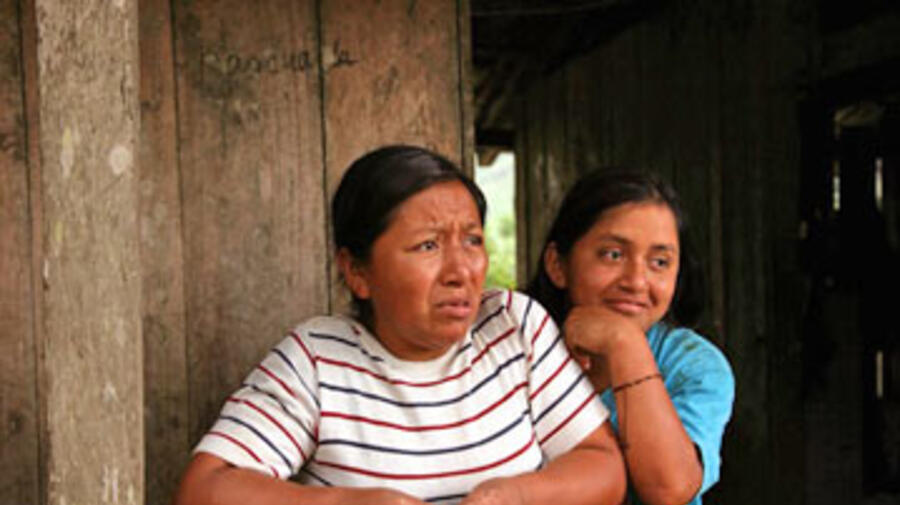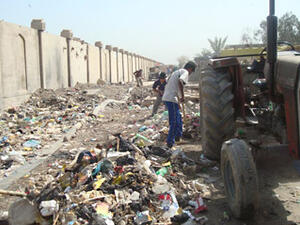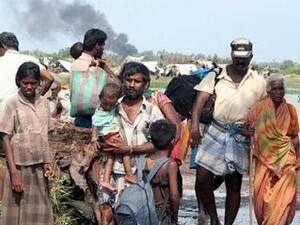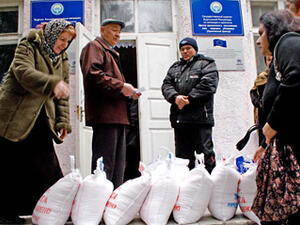Colombian indigenous seek refuge from violence in Ecuador
Colombian indigenous seek refuge from violence in Ecuador

Members of the Awa community think wistfully of home after reaching sanctuary in the village of Lita in northern Ecuador.
LITA, Ecuador, November 23 (UNHCR) - Only a few days after arriving in Lita, a mountain village in northern Ecuador, Doris* is still traumatised. The young girl, who belongs to Colombia's Awá indigenous community, was at school in late October when gunfire erupted outside. "We had to hide under our desks for three hours before we could leave and run away," she recalled. "When we left we saw helicopters in the air firing at the ground." They decided it was time to leave.
It was the third time this year that the Awá communities of southern Colombia's Nariño department have been caught in fighting between the army and an irregular armed group. An estimated 1,700 people have been trapped in the fighting. Some have fled to other parts of Colombia, a few - like Doris - have crossed into Ecuador and come to Lita, where many Colombian Awás have found permanent refuge from violence in the past few years.
Leon is another of the newcomers. He arrived in Lita at the end of October with his wife and two youngest children. Leon had already fled his home in July to seek refuge from fighting in a nearby Colombian town. This time he was too scared to even stay in the country. "There is a war going on over there," he said, "and the worst part is that it is a war where Colombians are killing Colombians."
The humanitarian situation in Nariño, one of Colombia's most remote and least developed regions, has deteriorated sharply in the past few months, with frequent combat between the army and irregular armed groups, the emergence of new armed groups in areas recently vacated by demobilised paramilitary bands, and several waves of mass forced displacement.
The cultivation of coca, the raw product for cocaine, has added to the cycle of violence with increased turf wars. Civilians are often caught in the middle.
"The situation is impossible," Leon said. "What can people do when they are ordered to grow crops they do not want to grow? They know they had better obey - the only other option is to go."
In Lita, Leon and his family are staying with another Awá family whose members arrived in Ecuador four years ago and have obtained refugee status. Eight people are crammed into a 30-square-metre wooden hut. With no job and no money, Leon admits to being worried about the future. But his biggest fear is that his two eldest sons, who are still in Colombia, will not be able to escape.
"No one can go in and out," he said. "People are trapped. We took nothing with us so that we would not raise suspicions. We just said that we were going to the market to buy food and they let us through. This was a few days before the fighting started."
It is difficult to know exactly how many people have crossed the border in recent weeks. UNHCR has increased its presence at the border, where 85 new cases were registered in October and 15 in the first week of November. But, like elsewhere in Ecuador, the number of those registering may be only the tip of the iceberg.
"The region is semi-tropical and remote, the terrain is mountainous and many places are not accessible by car," explained Hanne Meike Grol, head of the local UNHCR field office in Ibarra, some 100 kilometres away. "On top of this, people are very afraid and many prefer to remain hidden in the mountains. We rely on a network of refugees and local people to inform us and to tell the newcomers of their rights, but sometimes people take weeks or longer to register."
José and his family walked for three days across the mountains to reach Lita. Like Leon, he left Nariño just a few days before the fighting started. He had heard reports that irregular armed groups were trying to recruit fighters from the indigenous communities. "I have three teenage sons and I was so scared for them that I knew we had to leave," José said.
On the streets of Lita, the locals look at the new arrivals with curiosity. Most show sympathy and try to understand what the newcomers have gone through and what they are fleeing from. Many seem surprised and uneasy to hear about the violence taking place nearby and destroying the lives of so many.
By Xavier Orellana in Lita, Ecuador
* All names have been changed for protection reasons









